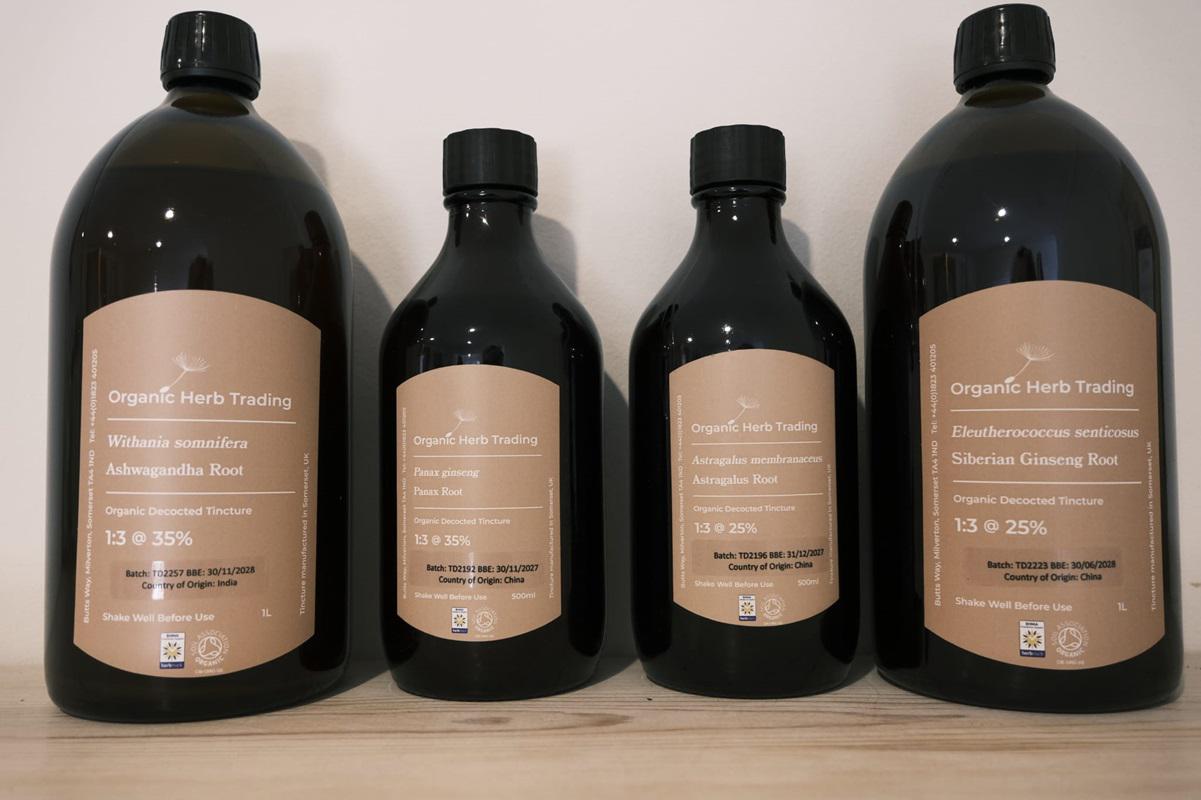19 December 2023
Product news
Adaptogens: Ashwagandha — from seed to bottle to you
In our modern world, where chronic stress is rife, herbalists are increasingly prescribing adaptogens to restore and support the health of their patients and increase resilience to stress
Despite the relatively recent naming of this group of herbs by Soviet researchers in the 1960s and their subsequent integration into Western herbal medicine, they have been in use for millennia in ancient medicinal practices of traditional Chinese medicine (TCM) and Ayurveda.
The historical use of adaptogenic herbs is reflected in where they are cultivated today and, consequently, where we source these herbs for our tinctures. Amidst the range of over 100 tinctures that we make here on our farm in Somerset, we stock four adaptogenic herb tinctures:
- Ashwagandha (Withania somnifera | 1:3 @ 35%)
- Siberian Ginseng (Eleutherococcus senticosus | 1:3 @ 25%)
- Asian Ginseng (Panax ginseng | 1:3 @ 35%)
- Astragalus (Astragalus membraneaous | 1:3 @ 25%)
The Ashwagandha (Withania somnifera) we use is grown in India. Our supplier works directly with farmers to ensure involvement throughout the entire supply chain from seed to packaging, ensuring sustainable production and contributions to conservation and biodiversity restoration.
Farmers are given guidance and support to acquire organic certification, procure seeds, condition the soil, and harvest and store their produce. As part of our supplier’s sustainability programme, they are carrying out the following initiatives: a bark regeneration study — to understand the regenerative capacity of tree species to preclude over-harvesting; annual tree plantation — planting saplings of 108 endangered species to assist their conservation and support biodiversity; social welfare programme — supporting schools, providing infrastructure facilities and distributing books and uniforms; rain water harvesting — in areas of water shortage, allowing some farmers to double their crops. Furthermore, our supplier processes the Ashwagandha that goes into our tinctures using renewable solar energy.
“Nothing is taken from the Earth without giving back” — Our supplier
Once the herbs have safely been harvested, dried, packaged, transported, and undergone rigorous quality testing, they arrive at our farm in Somerset. Our trained herbalists in the Liquids department then transform the dried root into tincture.
The extraction method and ratios of herb to ethanol are thoroughly researched to produce the highest quality tincture possible. Depending on the herb, we use either maceration, infusion or decoction techniques. This, combined with the specific alcohol concentration, enables us to extract the desired plant constituents.
For Ashwagandha, we decoct the herb and use 35% alcohol for extraction. Once the tinctures are pressed, separating marc (plant material) from menstruum (liquid), they are organoleptically analysed in-house before being bottled and labelled by hand.
Our tinctures are available in 500ml or 1l glass bottles, or in plastic jerricans for bulk quantities. Our packaging materials have been thoughtfully evaluated to minimise waste and damage and to uphold optimum quality throughout all aspects of the product.
For more than 40 years we have been dedicated to making high-quality, traceable, sustainably grown or wild-crafted herbs accessible to medical practitioners. This founding motive is imbued in everything we do and is why we are proud to share the journeys our tinctures make, from seed to bottle.
If you have any queries or wish to discuss bespoke tincture blends, don’t hesitate to get in touch to have a chat with our trained herbalists and experienced product developers.


